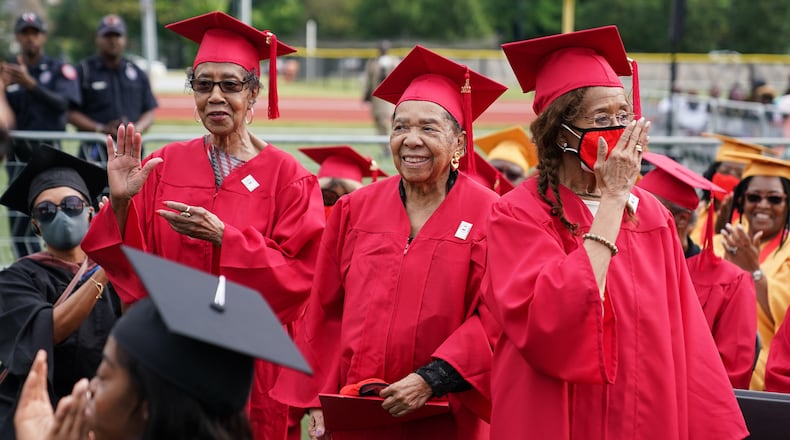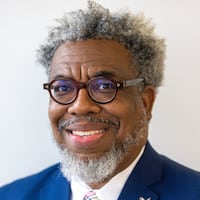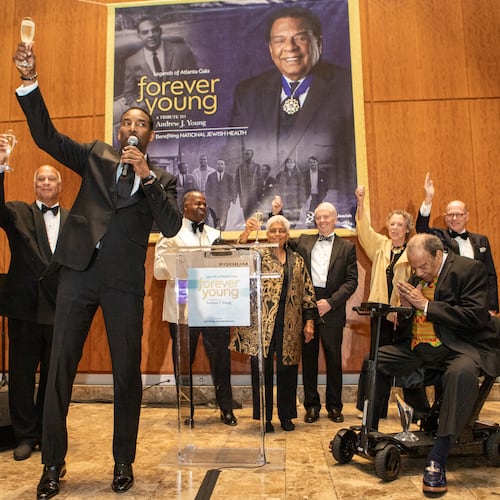Clark Atlanta University, which has more than 40,000 living alumni, has disbanded its alumni association in favor of a more streamlined system designed to create more direct connections with graduates of the Atlanta-based Black college.
According to CAU officials, the move responds to shifting alumni demographics and was made to “better connect (CAU) with its rapidly growing, global alumni community and embrace the evolving needs of its multigenerational alumni.”
Credit: Steve Schaefer
Credit: Steve Schaefer
“When we ask ourselves about what we can do to ensure that the CAU legacy endures for generations to come, at the top of the list is a strong and highly engaged alumni community,” said CAU President George T. French Jr.
“While student enrollment and engagement are vital for growth, being innovative in engaging our alumni is equally important to ensure the long-term stability of our institution.”
The changes, which went into effect Oct. 1, include the formation of a new alumni advisory council to guide CAU’s alumni engagement efforts and expand programming.
Lorri Saddler has been promoted to vice president and chief alumni engagement officer after serving as vice president of alumni affairs, and previously as associate vice president and dean of undergraduate admission. Two new alumni-focused positions will be added to her office.
Credit: Clark Atlanta University
Credit: Clark Atlanta University
“While we always appreciate volunteers, there is nothing like having someone on payroll who wakes up every day thinking about what we can do for the alumni,” French said. “The old system was not working anymore.”
The change follows a trend among other major HBCUs like Bethune-Cookman University, Howard University, and North Carolina A&T State University, which have abandoned the traditional alumni association model in favor of more university control.
“I have been telling people for years that we were headed in this direction, just looking at the tea leaves,” said Mark Fields, a 2000 CAU graduate and former board member of the National Alumni Association. “We have had our ups and downs, and some changes needed to be made. We needed fresh ideas.”
Credit: Ben Hendren for the AJC
Credit: Ben Hendren for the AJC
In May, the university conducted an alumni-wide survey, which revealed that 40% of the school’s graduates felt underserved by the former model. Many of them also sought “more personalized, dynamic, and digitally connected interactions.”
“We are moving forward with creating, crafting, and curating the future of alumni relations and engagement,” Saddler said. “This is very forward in terms of being in alignment with the direction that the university is going.”
Saddler added that the previous way the university engaged with alumni has not kept pace with growth, which is expected to exceed 71,000 members by 2075.
The current alumni base includes everyone who attended CAU since 1988, as well as graduates of Atlanta University and Clark College, like 102-year-old Margaret Aiken Jacobs who graduated in 1944.
Credit: Courtesy of Clark Atlanta University's FB
Credit: Courtesy of Clark Atlanta University's FB
“As a proud CAU alum, I’m excited about the direction we are heading,” said retired Judge Brenda H. Cole, the widow of CAU’s first president, Thomas Cole. “This new model will help us become a more connected and vibrant community, regardless of where our lives and careers take us.”
But it also comes after several years of chaos within the alumni association, marred with bickering and infighting.
According to several CAU graduates, the dysfunction within the alumni association fell along three lines: An institutional divide between graduates before and after Clark College and Atlanta University merged in 1988; a generational divide; and an ideology divide about how the organization should be run.
Fields, the former board member, said while there are 40,000 alums nationwide, there were only about 1,500 paid members. Saddler said that based on a three-year average, CAU’s alumni giving rate is between 10% and 12%.
Credit: Clark Atlanta University
Credit: Clark Atlanta University
According to U.S. News and World Report, only 11.2% of all HBCU graduates donate back to their schools. Only four HBCUs — Bennett College, Spelman College, Lane College, and Claflin, which is close to 50% — give at least 20%.
Saddler said she is working to get CAU numbers up.
“Everything that we do is about the students and the academic programs at the institution,” Saddler said. “We look to our alumni to be brand ambassadors, to support student recruitment, and to assist with fundraising. This will be a direct connection to that effort.”
Veverly Byrd-Davis graduated from Clark College in 1979. She said the changes were an “abrupt shift,” that was “especially disheartening,” and driven by a lack of communication between the university and the alumni.
“This move undermines the very essence of alumni engagement, which should be built on meaningful relationships between the institution and its graduates — not reduced to transactional interactions,” Byrd-Davis said.
“Alumni are not just financial contributors. We are ambassadors, mentors, and advocates who play a vital role in supporting the university’s mission. To sideline actual alumni in favor of administrative control sends the wrong message about our value.”
Byrd-Davis, who served as president of CAU alumni chapters in both Atlanta and DeKalb County, said while she remains committed to helping students, she will no longer participate in any fundraising campaigns affiliated with the institution.
“This decision has eroded trust,” she said.
Become a member of UATL for more stories like this in our free newsletter and other membership benefits.
Follow UATL on Facebook, on X, TikTok and Instagram.
About the Author
Keep Reading
The Latest
Featured








